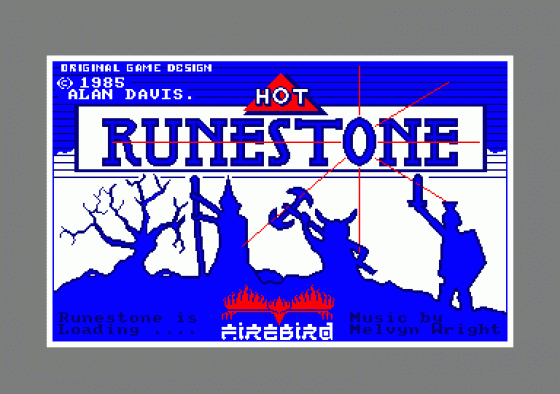
Amstrad Action
 1st March 1986
1st March 1986
Categories: Review: Software
Publisher: Firebird
Machine: Amstrad CPC464
Published in Amstrad Action #6
This is a real humdinger, this one is. It has its history way back in the Dark Ages of computer adventures when it was first proposed by Games Workshop. Much water (some of it rather muddy) has passed under the bridge since then and now Firebird have brought it out on the Amstrad as one of their "Hot" Releases.
The game concerns the struggles of three main characters: Morval the Warrior, Kliador the Elf and Greymarel the Wizard - against the evil Kordomir. Belorn, their homeland, is under constant attack from the Orcs who swoop down from the North to pillage and conquer on Kordomir's behalf.
At the beginning of the game, the situation is heavily weighted against Morval and his companions. All they (and you) know is that somehow you must recover the mystical Runestone and use it to destroy Kordomir.
This game has strong similarities to Lords Of Midnight. You can control three characters, and the display shows the countryside immediately adjacent to the character concerned. You can move around by first facing your character in one of the four main compass directions and then typing MOVE or MO (or just M).
However, the similarities to Midnight are rather deceptive. Although there are plot parallels as well, the two programs are really quite different. Runestone is a more ambitious program in many respects - it accepts complex inputs such as "Say to Eliador 'Give Morval the shield'" or "Fight Noggin with the axe". Furthermore, the program runs in real time, manipulating the other characters and engineering your destruction while you sit and gaze at the screen.
And the screen is well worth gazing at. The display is nothing short of excellent - considerably better than Midnight and beautifully drawn. The landscape scrolls very smoothly and shows great detail. There's also a picture of your character at the top of the screen who blinks and grimaces very realistically every few seconds just to remind you that the Orcs are on your tail.
Although you know roughly what's going on when you start the game, Runestone leaves you very much to your own devices. In Lords Of Midnight, the player has a good idea of his objectives and how (in theory, at least) to achieve them. However, in Runestone, things are far less clear and you have to do a lot of discovering to find out what will best serve your cause. For example, you soon stumble across a magic staff which you know (from the blurb) is extremely important in the game. How and when to use it however, is up to you to discover. In this respect, Runestone is much more like a traditional adventure than Lords Of Midnight, which was in essence more of a war-game.
The program comes with a very attractive, but not exactly detailed, map - just enough to get you going in the right direction without giving too much away. There's also a booklet (beautifully produced) that gives you some background info and, of course, instructions on how to play the game. Special features include a dump to printer command. The only slight annoyance is that (again like Midnight) you can't restart the game if you get killed without re-loading.
Actually, playing Runestone is a joy. The display is particularly impressive, with an attractively re-designed character set that scrolls very swiftly up and away each time you change location. The vocabulary isn't in fact very large, and (like Midnight) there are a large number of empty locations, but the parser is very intelligent and you won't find yourself having too many communication problems.
There's a tremendous sense of humour in the game. If, for example, you enter a command that the program doesn't recognise, then the figure at the top of the screen will frown and stick his tongue out! Trying to do the wrong thing will frequently receive a witty response. While controlling Morval, I attempted to 'Climb the Tee'. "Morval is getting desperate!" the program replied with dry humour.
My only real criticism of Runestone is that you can only move in four directions. This involves a lot of unnecessary moving about in order to get your character into a particular location and I can't imagine that it would have been too difficult to include North-East, South-West, and so on. As it is, if you get stuck in a cul-de-sac or are negotiating a number of different obstacles at once, you find yourself having to go first one way and then the other to make progress! Since there's a sense of urgency m the game, with the Amstrad bleeping every few seconds to remind you that time is passing, this slowing of the pace is rather frustrating.
Runestone is a very ambitious program. Let's hope Firebird bring out some more games like this. Paul Jacobs, speaking for the company, said that he was currently looking at a very significant adventure-related project. Keep your fingers crossed.
Runestone




